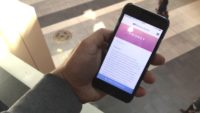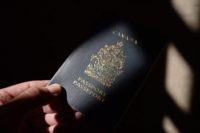A Canadian real estate company already under investigation for using facial recognition technology in malls may also be tracking the movement of shoppers using mobile phones. A former employee of Cadillac Fairview told CBC News he was aware of at least one of the company’s Canadian shopping centres that had a system installed to track cellphone movement throughout the mall to collect market research data. CBC News has agreed to keep the former employee’s identity confidential. He worked directly for Cadillac Fairview in security for more than three years, and was responsible…
Read MoreTag: Privacy
Can Canadian Border Agents Search Your Phone Or Laptop? A New Guide Explains | CTV News
A civil liberties group has published a new guide for people concerned about Canadian border agents searching their electronic devices like smartphones, laptops and tablets. Although there are unsettled legal questions about how these searches should work, the B.C. Civil Liberties Association says “the bottom line is that the CBSA can and does search electronic devices at the border” without a warrant and sometimes randomly. That means border agents could end up seeing private emails and text messages, photos, web browser histories and sensitive documents, even if you’ve done nothing…
Read MoreThe TSA Has Been Quietly Tracking American Travelers Who Are Not On Government Watch Lists | The Verge
According to a new report from The Boston Globe, federal air marshals are tracking American citizens who are not currently under investigation or on a terrorist watch list by way of a previously unknown Transportation Security Administration (TSA) program. The program is called “Quiet Skies,” which directs federal air marshals to track Americans on domestic flights who may be affiliated with someone on a watch list or whose travel patterns mirror those of suspected terrorist. Individuals being tracked through Quiet Skies are not suspected of any crimes, according to the…
Read MoreWill Canada Become The Next Country To Offer Mobile Passports? Feds Studying Idea Despite Privacy Fears – National | Globalnews.ca
Immigration officials are exploring the idea of allowing Canadians to renew or potentially use their passports via mobile apps on their phones. If you have a Canadian passport, you know the deal. Every five to 10 years, you go through the process of filling out forms, gathering photos and references and mailing it all in to Passport Canada, all in the name of renewing the little blue booklet that lets Canadians travel abroad. Once at the airport, you take it out for check-in, during security screenings, to show the gate…
Read MoreSmart TVs Are Invading Privacy And Should Be Investigated, Senators Say | Ars Technica
Two Democratic US senators have asked the Federal Trade Commission to investigate privacy problems related to Internet-connected televisions. “Many Internet-connected smart TVs are equipped with sophisticated technologies that can track the content users are watching and then use that information to tailor and deliver targeted advertisements to consumers,” Sens. Ed Markey (D-Mass.) and Richard Blumenthal (D-Conn.) wrote in a letter yesterday to FTC Chairman Joseph Simons. “Regrettably, smart TV users may not be aware of the extent to which their televisions are collecting sensitive information about their viewing habits.” The…
Read MoreStudy Calls Out ‘Dark Patterns’ In Facebook And Google That Push Users Toward Less Privacy | TechCrunch
More scrutiny than ever is in place on the tech industry, and while high-profile cases like Mark Zuckerberg’s appearance in front of lawmakers garner headlines, there are subtler forces at work. This study from a Norway watchdog group eloquently and painstakingly describes the ways that companies like Facebook and Google push their users towards making choices that negatively affect their own privacy. It was spurred, like many other new inquiries, by Europe’s GDPR, which has caused no small amount of consternation among companies for whom collecting and leveraging user data…
Read MoreCanadians At Risk Of Being ‘Data Cows’ Absent Big Data Strategy, Documents Show | CBC News
Artificial intelligence could give internet giants like Facebook and Amazon even more power to reshape the Canadian economy, threatening the viability of domestic businesses, researchers warn. A December presentation to senior civil servants said that Canadian companies were losing ownership of — and access to — data to the likes of Facebook, Amazon, Netflix and Google, requiring a federal policy response. Artificial intelligence “will reinforce this trend,” presenters from the National Research Council warned top officials, adding that a national data strategy would be necessary to prevent Canada from becoming…
Read MoreMounties, CSIS Still Haven’t Publicly ID’d People Behind Electronic Cell Surveillance In Ottawa | CBC News
After investigating for over a year, the RCMP and the Canadian Security Intelligence Service (CSIS) are still unable to publicly identify those who have deployed electronic espionage devices in the national capital. In April 2017, a CBC/Radio-Canada report revealed that IMSI catchers were being used in Ottawa and Montreal. These devices can capture cellphone data and listen to telephone conversations. News that sophisticated spying tools had been deployed within range of Parliament Hill caused some tumult within the government. Following the CBC/Radio-Canada report, Public Safety Minister Ralph Goodale announced the launch…
Read MoreAs Google For Education Tools Enter Classrooms Across Canada, Some Parents Are Asking To Opt-out | CBC Radio
Last October, Riaz Bassari’s daughter came home from her elementary school class with a permission form for G Suite for Education: a set of cloud-based digital learning tools Google offers to schools for free. The form, issued by the Greater Victoria School District in B.C., asked Bassari to agree that “my child’s personal information will be used for a Google Apps for Education account.” Bassari, however, decided to not to sign the form, and soon discovered there was no alternative to Google’s tools at his daughter’s school. “You either sign up or you’re left out,” Bassari…
Read MoreA Trip To The ER With Your Phone May Mean Injury Lawyer Ads For Weeks | Ars Technica
With digital traps in hospitals, there’s no need for personal injury lawyers to chase ambulances these days. Law firms are using geofencing in hospital emergency rooms to target advertisements to patients’ mobile devices as they seek medical care, according to Philadelphia public radio station WHYY. Geofencing can essentially create a digital perimeter around certain locations and target location-aware devices within the borders of those locations. Patients who unwittingly jump that digital fence may see targeted ads for more than a month, and on multiple devices, the outlet notes. While the…
Read More









